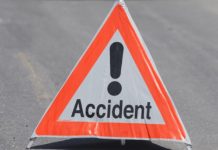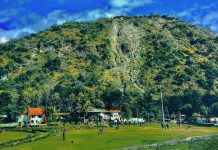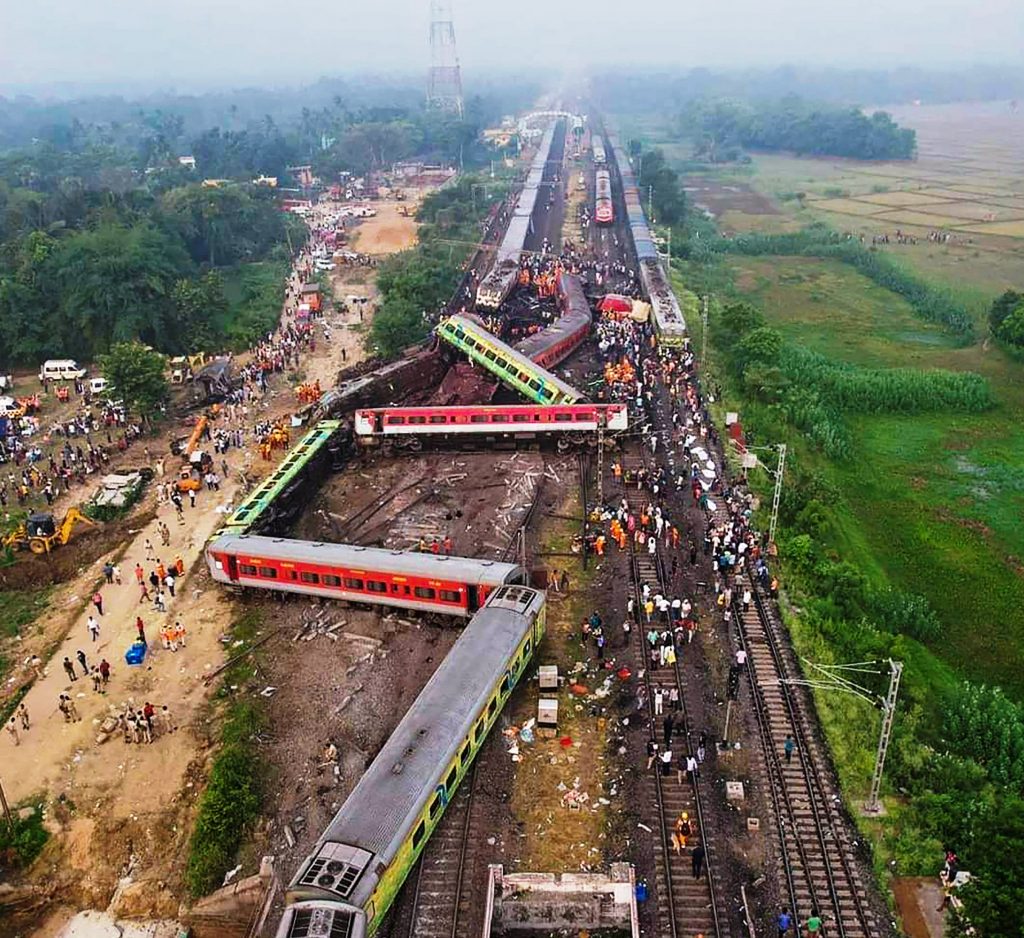
The Centre comes under the Opposition fire for exhibiting complete disregard of rail safety by ‘ignoring’ earlier warnings that flagged several gaps in the system, writes Amit Agnihotri
The Opposition has slammed the Centre over safety of the huge railway network and demanded that Union Railway Minister Ashwini Vaishnaw be removed after the deadly, three-train accident in Odisha’s Balasore left around 290 passengers dead and around 1000 injured.
The triple-train accident involved the Bengaluru-Howrah Superfast Express, the Coromandel Express and a goods train on three separate tracks at Bahanaga Bazar station in the Balasore district of Odisha on June 2.
Prima facie, electronic signal failure appeared to be the main reason behind the ghastly accident, which raised several questions about maintenance of the vast railway network used by 2.2 crore passengers every day.
The opposition parties including the Congress, TMC, Shiv Sena UBT and CPI asked PM Modi, who visited the accident site along with Railway Minister Vaishnaw, to take responsibility for one of the worst accidents even as it alleged that the government was indulging in a public relations exercise to hide its failures.
The Opposition was also angry that the government had ordered a CBI probe into the accident, citing a sabotage angle, arguing that the Commissioner Railway Safety, who is a technical expert, should have been entrusted with investigation into the tragedy instead.
The Opposition also questioned the government’s flip-flop over the accident in first announcing a CRS probe, then railway minister saying the root cause of the accident had been identified before suddenly handing over the case to the CBI.
“This is a conspiracy by the PM and the railway minister to deflect public attention from its failures. The government is talking about sabotage behind the accident but the CBI FIR only talks about the negligence issue,” Congress leader Ajoy Kumar said, adding, “The CBI is not a technical body and probes crime cases. The CRS is the technical authority which should probe a train accident and it has been placed under the aviation ministry to insulate it from any railway ministry influence.”
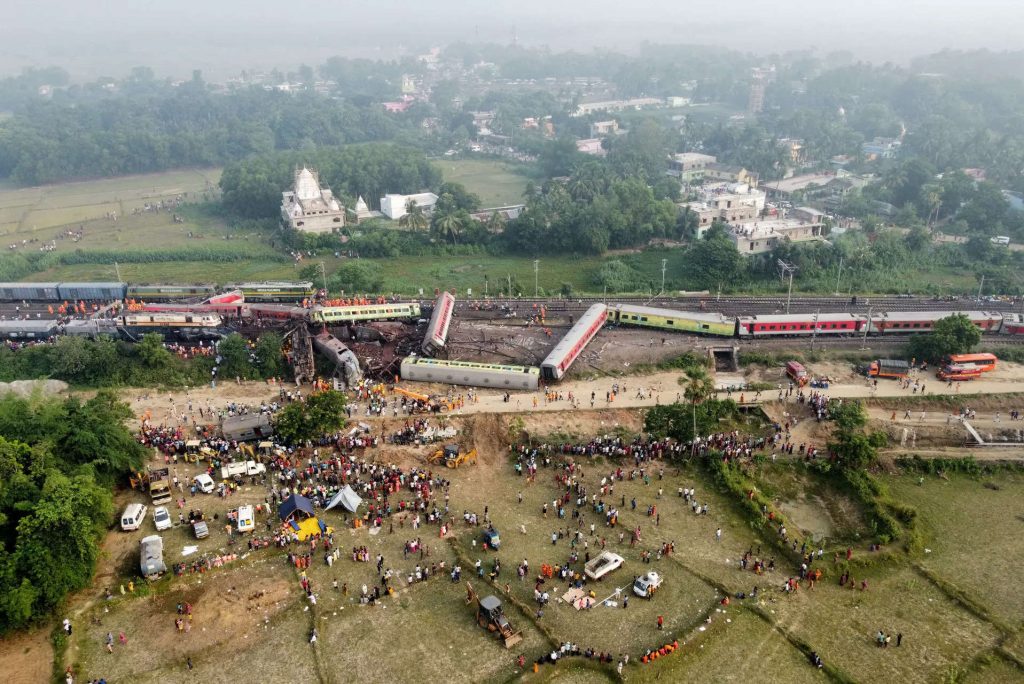
According to Congress leader Supriya Shrinate, earlier train accident probes given to the NIA had not produced any result over the past seven years.
“Indian Railways carries about 2 crore 20 lakh people to their destinations every day, which is almost the population of Australia. Every single day, 2 crore 20 lakh people are on the tracks of Indian Railways, but when accidents like Balasore happen, how is it that there is no accountability, no responsibility and instead of finding out what caused this grave accident where almost 300 people died, the government is now spinning conspiracy theories, and shifting the focus away from safety to all kinds of conspiracy theories like deliberate interference,” Shrinate said.
The Congress leader then went on to deliberate on the futility of the CBI probe ordered by the government. “ You have roped in the CBI, but you had roped in the NIA in the 2016 Kanpur train accident as well. Not a single proof has been found by the NIA. The NIA has even not been able to file the chargesheet in the Kanpur train accident. The NIA has also not been able to file the chargesheet in the Kuneru, Andhra Pradesh train accident, where almost 40 people died. Between Kanpur and Kuneru, almost 192 people were killed in these rail accidents… the NIA was probing, but the reality is… this happened due to the interlocking failure, this happened due to the signal failure, this happened due to low track maintenance and I think the very basic question is- why should premier agencies like CBI and NIA be roped into this, because, this is not their area of expertise. Why should the CRS not probe into this accident? Why has the CRS been restricted to probe only 8 to 10 percent of rail accidents that happen,” Shrinate said
The CBI, said Shrinate, would not be able to look into the reasons behind the neglect of the railways over the past years.
“Will the CBI find out why three lakh positions are vacant in the railways? Will the CBI find out why loco drivers are being made to work more than 12 hours? Will the CBI find out why the track maintenance fund has been cut by 23 per cent? Will the CBI find out why the Rashtriya Rail Sanraksha Kosh funding has been reduced by 79 per cent? Will the CBI find out all these things, because these are questions that the elected government of the day needs to answer. Why must we not assert that once again the Modi government is shifting the focus away from its own failures and from the failures of the railways which has refused to prioritise safety of citizens,” asked Shrinate.

“The government is instead turning the focus away from them by roping in the CBI or any such agency because this has not led to a conclusion before. It has been 7 years since the 2016 Kanpur train accident, but not a single chargesheet has been filed by the NIA and we fear that exactly the same thing will happen with this CBI probe. The reality is that accidents are happening because safety of passengers is not the priority of this government. Will the CBI probe why the Chintan Shivir did not allow a discussion on passenger safety and kept talking about revenue instead,” she said.
Congress leader Ajoy Kumar pointed out that over the past four years, 1,129 trains had derailed as the tracks were not maintained properly and the fund meant to be spent on track upgradation was reduced by Rs 2000 crore.
He cited the derailment of a goods train in the Balasore area and the Delhi-Bhubaneswar Rajdhani Express that had a narrow escape from crashing into a tractor trolley at a manned railway crossing in West Bengal, just days after the Balasore accident to support his charge.
Red Flags Brushed Aside?
According to the opposition, there were “serious deficiencies, criminal negligence and complete disregard for safety and security” of the railways over the past years despite the CAG and a parliamentary panel pointing out several gaps in the system earlier.
Rahul Gandhi, while addressing the Indian diaspora in the US, hit out at the Centre over the horrific triple-train accident in Odisha, claiming that the only ideology that it espoused was to make excuses and not accept the reality. While speaking in New York as part of his visit to the US, Rahul claimed that the BJP was in the habit of not owning up to its mistakes and shifting the blame, instead, to the Congress when questioned. “You ask them (BJP) anything, they will look back and pass the blame. Ask them how the Odisha train accident happened. They will talk about what the Congress did 50 years ago. I remember a train accident when the Congress party was in power. The Congress did not say that the train crashed because of the fault of the British. The minister in charge of the railway at the time said, ‘It’s my responsibility and I’m resigning’. So, this is the problem we have back home,” he said.
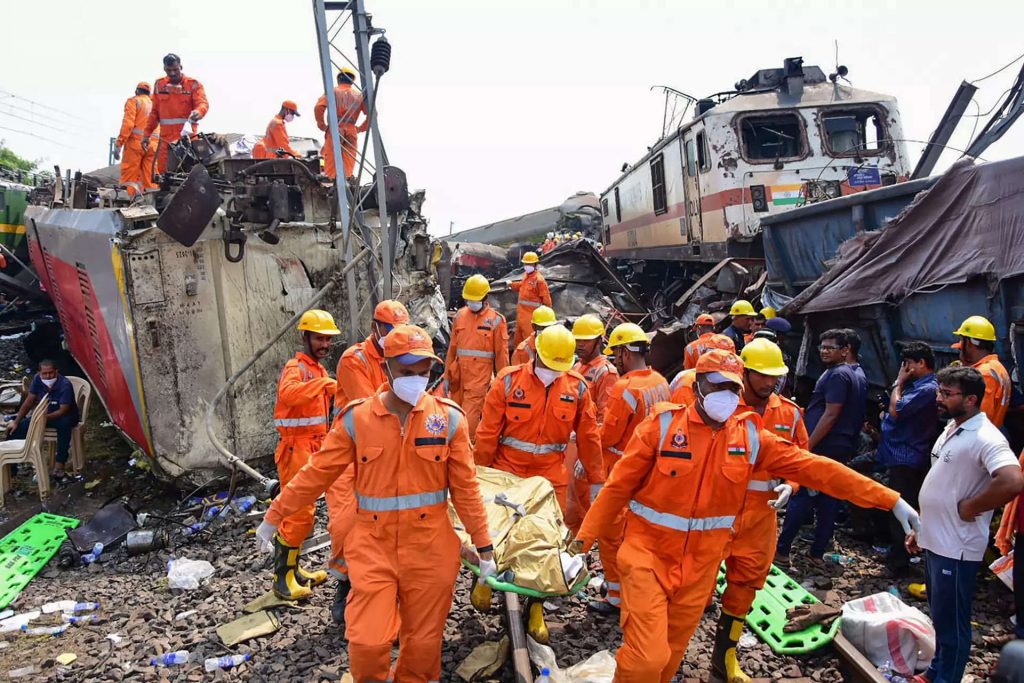
Congress MP Shakti Sinh Gohil and party’s media head Pawan Khera alleged that the Odisha train accident was a “man-made devastation” caused by “utter negligence, serious lapses in the system, incompetence, and a narcissistic sense of know-it-all attitude of the Modi government.”
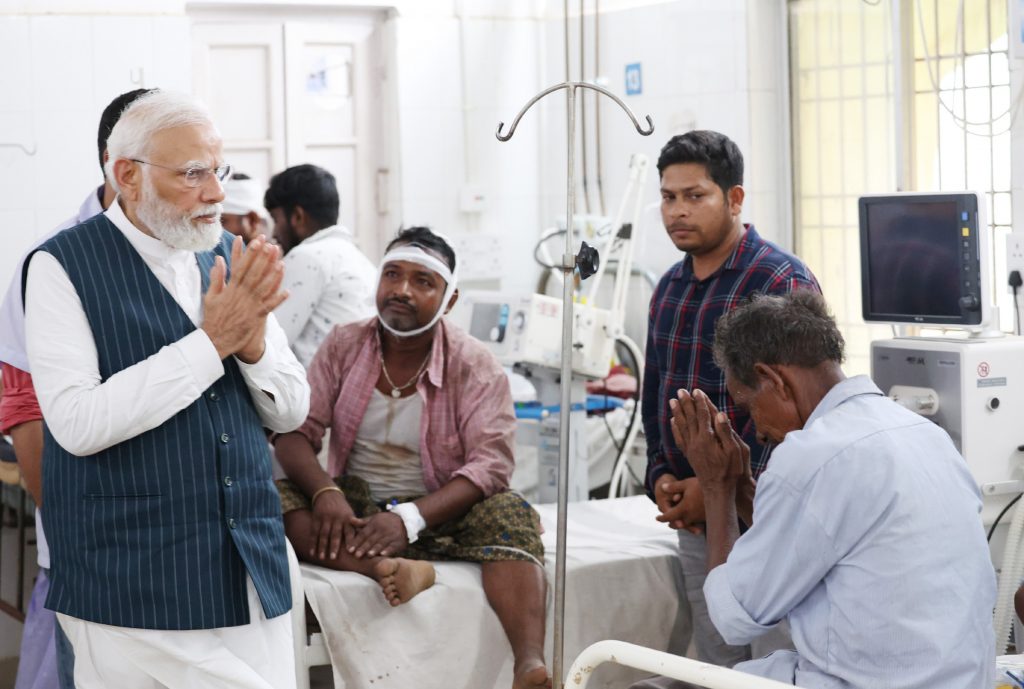
“PM Modi, who said that the ‘guilty would be punished, should start with the railway minister. Unequivocally and unambiguously, we demand the resignation of the Union Railway Minister Ashwini Vaishnaw. Nothing short of it,” Gohil and Khera said.
The Congress leaders questioned the central government saying, “PM Modi himself is responsible for a green-flagging spree of Vande Bharat Express trains. He himself is responsible for creating this ‘all is well’ facade in the Indian Railways, even as crucial, sensitive, and critical infrastructure of the Indian Railway languishes is suffering from neglect. We demand that despite multiple warnings by the CAG, Parliamentary Standing Committees, and experts — why did the Modi government not spend on sprucing up railway safety?”
The Congress leaders also asked when will the government implement the much-hyped KAVACH Anti-Collision system nationwide, after testing the same and said that past railway ministers had resigned on moral grounds after big accidents.
“We don’t look for political scores during human tragedy. Madhavrao Scindia, Nitish Kumar and Lal Bahadur Shastri resigned on moral grounds. The Railways Minister should take responsibility but Modi and morals travel in opposite directions,” they said.
Congress MP Jairam Ramesh said, “I recall that Lal Bahadur Shastri resigned in the wake of the Nov 1956 Ariyalur train disaster and Nitish Kumar did so following the ghastly Aug 1999 Gaisal train tragedy.” “It reinforces why safety should always be the foremost priority in the functioning of the rail network. There are many legitimate questions that need to be raised but that should wait till tomorrow,” said Ramesh.
Former MoS railways and Congress MP Adhir Ranjan Chowdhury, who visited the accident site, said that there was “mismanagement” which led to the loss of so many lives.
West Bengal Chief Minister and TMC supremo Mamata Banerjee, who visited the train accident victims, remarked in the presence of Vaishnaw that the accident could have been averted had the train been fitted with an anti-collision device.
“Coromandel is one of the best express trains. I was the railway minister three times. From what I saw, this is the biggest railway accident of the 21st century. Such cases are handed over to the Railway’s Safety Commission and they investigate and give a report. There was no anti-collision device on the train, as far as I know. Had the device been on the train, this would not have happened”, she said.
“The Railway minister was standing with me. I should have said a lot of things because I had served as a railway minister in the past. Why was there no anti-collision device in Coromandel Express and Bengaluru-Howrah Express? The railway has been left to be sold”, Banerjee said in Kolkata later. “When he was present with me and I mentioned anti-collision devices, why didn’t he open his mouth? ‘Dal mein kuch kaala hai’, we want the truth to come out,” Banerjee said.
CPI MP Binoy Viswam too demanded that Railway Minister Ashwini Vaishnaw should resign over the Odisha incident. “The government concentrates only on luxury trains. Trains and tracks of common people are neglected. Odisha deaths are the result of this attitude. The railway minister must resign,” Viswam said.
This prompted the Centre to put out briefs on the latest iteration of Kavach technology, and its deployment plans. The anti-collision system is still under development. Union Railway Minister Ashwini Vaishnaw said that the “root-cause” of the incident has been identified, and said that it was the issue of point machine and electronic interlocking. The change that was done to electronic interlocking which led to the accident had been identified, Vaishnaw said while denying that the incident had anything to do with the anti-collision system “Kavach”.
Every Indian Is Shaken: Kharge to PM
Congress chief Mallikarjun Kharge, who himself has served as railway minister in the past, wrote a letter to the Prime Minister over the accident. “The devastating train accident in Balasore, Odisha, which is one of the worst such mishaps in Indian history, has shocked the nation. The country stands united in this hour of grief. However the loss of so many precious lives has shaken the conscience of every Indian. The loss of these lives is irreparable and no amount of monetary compensation or words of condolence can make up for this grave tragedy,” he said in the letter.
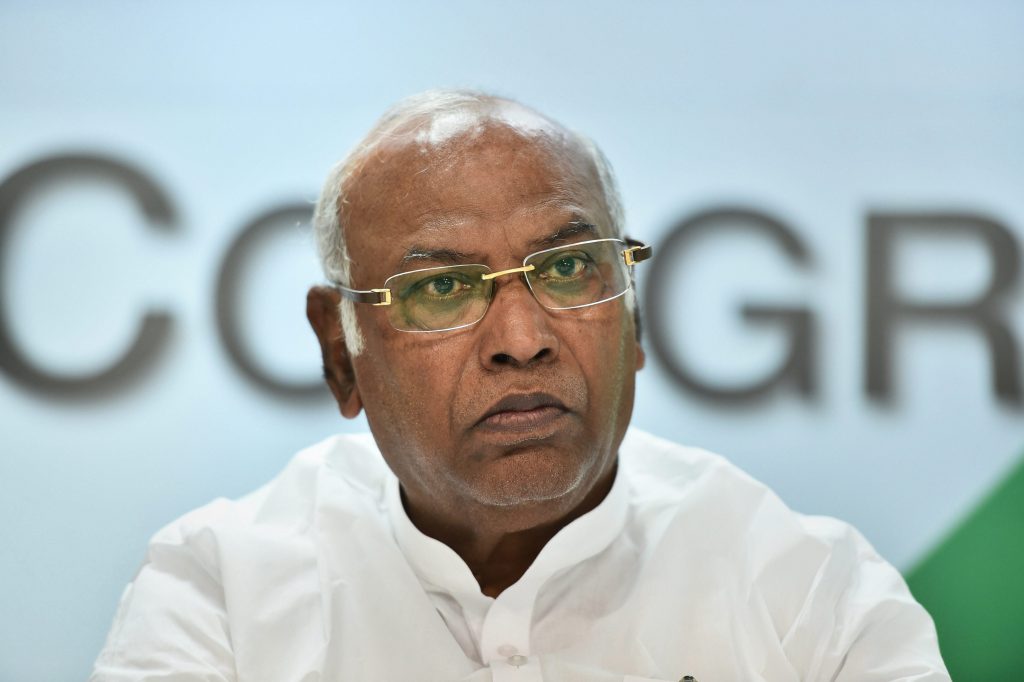
The Congress president then went on to charge the Modi-led Central government of meting out a “step-motherly treatment” to the railway. “Despite all the revolutionary strides in the field of transportation, Indian Railways is still a lifeline for every common Indian. It isn’t just the most reliable but also the most economical mode of transport. It’s remarkable how the railways transport passengers that equal the whole population of Australia every single day. But I say with remorse that instead of focusing on strengthening the railways at the basic level, only superficial touch up is being done to stay in news. Instead of making the railways more effective, more advanced, and more efficient, it is instead being meted out with step-motherly treatment. Meanwhile, consistently flawed decision-making has made travelling by rail unsafe and has in turn compounded the problems of our people,” Kharge said.
Kharge then sought to draw Prime Minister Modi’s attention to a few important facts. “At present about 3 lakh posts are lying vacant in Indian Railways. In fact, in the East Coast Railway – the site of this tragic accident – about 8278 posts are vacant. It’s the same story of apathy and negligence even in the case of senior positions, where both the PMO and the Cabinet Committee play a crucial role in appointments. There were more than 18 lakh railway employees in the decade of nineties, which have now been reduced to about 12 lakhs, of which 3.18 lakh are employed on contractual basis. Vacant posts pose a threat to the assured jobs of people who belong to SC/ST/OBC and EWS. It’s a pertinent question to ask – why have such a high number of vacancies not been filled over the last nine years,” he said.
The Congress chief further said that the Railway Board itself has recently admitted that loco pilots have had to work longer hours than mandated due to manpower shortage. “Loco pilots are crucial to rail safety and their overburdening is proving to be the main reason behind accidents. Why have their positions not been filled yet,” he questioned.
Kharge said that on February 8, 2023, the Principal Chief Operating Manager of South West Zonal Railway, referred to the collision of two trains in Mysore, and asserted the need to repair the signalling system and had also forewarned about potential accidents in the future due to this flaw. “But why and how could the Ministry of Railways ignore this crucial warning,” he wondered.
The Congress chief also said that the Parliamentary Standing Committee on Transport, Tourism and Culture in its 323rd Report (December 2022) had criticized the complete apathy and negligence of the Railway Board towards recommendations of the Commission of Railway Safety (CRS).
“The report further revealed how the CRS investigates only 8 percent to 10 percent of train accidents. Why has no effort been made to make CRS stronger and ensure its autonomy,” he said.
According to Kharge, the latest audit report of CAG, made a special mention of how between 2017-18 to 2020-21, about 7 out of 10 train accidents happened due to derailment from tracks.
“But this was erroneously ignored. Between 2017-21, there was zero testing of Rail and Weld (Track Maintenance) for safety in East Coast Railway. Why were these grave red flags ignored,” questioned Kharge.
“The CAG report also highlighted that funding for the Rashtriya Rail Sanraksha Kosh (RRSK) had been reduced by a massive 79 percent. It was claimed during the budget presentation that about Rs 20,000 crore would be available annually, but this was not done. Why were the required funds not allocated for track renewal work? Is this not being callous about the safety of passengers,” said Kharge.
The Congress chief asked why the previous government’s plans to roll out the anti-train-collision system, originally named Raksha Kavach, was put on the back burner?
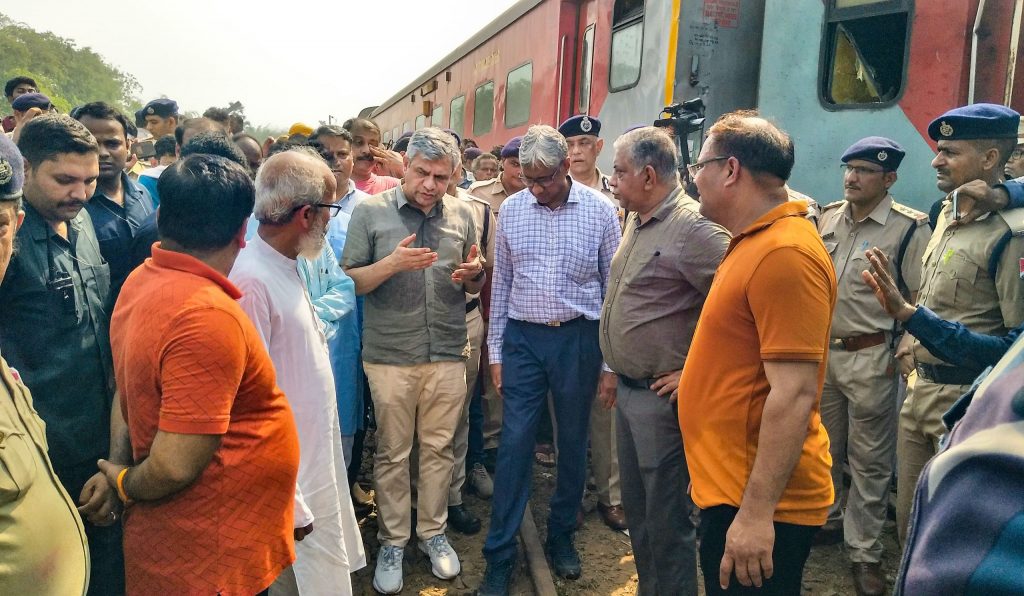
“This system was developed by the Konkan Railway and tested successfully by the Research Designs and Standards Organization (RDSO) in 2011, it was meant to prevent collision of trains. Your government simply renamed the scheme ‘Kavach’ and in March 2022, the Railway Minister himself projected the rechristened scheme as a novel invention. But the question still remains, why have only a measly 4 percent of routes of Indian Railways been protected by ‘Kavach’ till now,” Kharge said.
The Congress chief further asked, “What was the reason for merging the Budget for Indian Railways with the Union Budget in 2017-18? Has this not adversely affected the autonomy and decision-making capacity of Indian Railways? Was this done to undermine the autonomy of Railways to push reckless privatisation? Even though privatisation of Railways was repeatedly opposed during Parliamentary proceedings, all concerns have been ignored by bringing trains to stations under the ambit of brazen privatisation. It’s apparent that the government’s arbitrary decision making, including the National Rail Plan for up to 2050, without any consultation or detailed discussion, is aimed at exploiting the railways and making it an easy target and fodder for private companies.”
According to Kharge, a huge entity like the Indian Railways had brought respite to all sections of the society since Independence.
“But it’s puzzling to comprehend, who has been the beneficiary of the decision to withdraw concessions that were being given to the elderly, children and women during the pandemic? The insensitivity is evident when upper berths are being allotted to the elderly and women, who are also being forced to face different kinds of problems now,” he said.
“Unfortunately, the people in charge – your good self and Railway Minister Ashwani Vaishnav – do not want to admit that there are problems. The Railways Minister claims to have already found a root cause, but yet has requested the CBI to investigate. The CBI is meant to investigate crimes, not railway accidents. The CBI, or any other law enforcement agency, cannot fix accountability for technical, institutional and political failures. In addition, they lack the technical expertise in railway safety, signalling, and maintenance practices,” Kharge said.
The Congress chief pointed out that the nation still remembered the 2016 derailment in Kanpur, where 150 people lost their lives.
“The then Railway Minister had asked the NIA to investigate. Subsequently, you yourself claimed in an election rally in 2017 that there was a “conspiracy”. The nation was assured that strictest punishment would be meted out. However, in 2018, the NIA closed the investigation and refused to file a chargesheet. The nation is still in the dark – who is responsible for 150 avoidable deaths,” asked the Congress president.
“The statements so far and the roping in of yet another agency without the required expertise, remind us of 2016. They show that your government has no intent to address the systemic safety malaise, but is instead finding diversionary tactics to derail any attempts to fix accountability,” he said.
According to Kharge, the latest train accident in Odisha had been an eye opener for all.
“All the empty safety claims of the railway minister have now been exposed. There is serious concern among the common passengers about this deterioration in safety. Therefore, it is incumbent upon the government to ascertain and bring to light the real reasons that caused this grave accident. Today, the most crucial step is to prioritise installation of mandatory safety standards and equipment across railway routes to ensure safety of our passengers and pre-empt recurrence of an accident like the one at Balasore,” said Kharge.
Major Train Accidents in India
October 2018: A commuter train in Amritsar killed at least 59 people and injured 57 among a crowd that had come on tracks to watch the Dussehra celebrations.
January 2017: At least 41 people were killed after several coaches of a passenger train derailed near the village of Kuneru in Vizianagaram, Andhra Pradesh.
August 2017: The Puri-Haridwar Utkal Express derailed killing 23 people and injuring nearly 60 others after 14 of the 23 coaches of the train derailed near Khatauli in the Muzaffarnagar district of Uttar Pradesh.
August 2017: Nine coaches of Kaifiyat Express derailed near Auraiya, Uttar Pradesh, causing at least 70 injuries.
November 2016: Around 146 people were killed and more than 200 injured when the Indore–Patna Express 19321 derailed near Pukhrayan, Kanpur at around 3.10 am. Around fourteen carriages were derailed.
May 2014: The Gorakhdham Express collided with a halted goods train in close proximity to Khalilabad station, resulting in 25 fatalities and more than 50 injuries in Sant Kabir Nagar area of Uttar Pradesh.
May 2012: The Hampi Express, a cargo train, and the Hubli-Bangalore Hampi Express collided close to Andhra Pradesh. Nearly 25 fatalities and about 43 injuries were reported.
July 2011: Around 70 people were killed and over 300 injured when 15 coaches of Howrah-Kalka Mail derailed near Malwan in Fatehpur.
October 2005: Several coaches of a passenger train derailed in southern Andhra Pradesh near Velugonda. At least 77 people were killed in the accident.
August 1999: Two trains collided near Kolkata leading to the death of at least 285 people. Signal failure played a role.
August 1995: At least 350 people were killed when two trains collided 200 km from Delhi.
July 1988: An express train plunged into a monsoon-swollen lake near Quilon in southern India, killing at least 106 people.
June 1981: At least 800 people were killed when seven rear coaches of an overcrowded passenger train were blown off the track and fell into a river during a cyclone.
Could Kavach help avert Odisha train tragedy?
The CBI probe into the Balasore triple train tragedy will look into multiple dimensions of the mishap, and will also try to find out whether Kavach, the ace security system of the railways, could have averted the mishap, writes Aravind Mohapatra
As the CBI probe into the June 2 Bahanaga triple train tragedy continues, the investigating agency is expected to look into multiple dimensions of the mishap including whether KAVACH, the ace security system of the railways, could have averted the mishap that claimed 288 lives officially and left more than 1100 injured. The inquiry was handed over to the CBI on the recommendation of the Railway Board as there is a strong suspicion about the possibility of sabotage.
Neither the Shalimar-Coromandel Express nor the Yeshwantpur-Howrah Express, which suffered severe damage in the accident with multiple bogies getting derailed after Coromandel hit a stationary goods train at Bahanaga Bazar railway station leading to a chain reaction, were fitted with KAVACH. This is an indigenously developed Automatic Train Protection (ATP) system by the Research Design and Standards Organisation (RDSO) in collaboration with the Indian industry.
KAVACH is meant to provide protection by preventing trains to pass the signal at Red (which marks danger) and avoid collisions. It activates the train’s braking system automatically if the driver fails to control the train as per speed restrictions. In addition, it prevents the collision between two locomotives equipped with functional Kavach systems. The system also sends out SoS messages during emergencies.
However, neither the Shalimar-Chennai Coromandel Express nor the Yeshwanthpur-Howrah Express were fitted with KAVACH-TACS. The Kavach system project is yet to be implemented on the Howrah-Kharagpur-Chennai line which these trains were running on. However, sources said the probe agency has been told by railway officials that even KAVACH would not have averted the accident as the reaction time in the case the accident was too short. Since an obstruction in the form of the stationary goods train came in front of Coromandel Express, running at a speed of around 128 kms per hour, so suddenly it was difficult to avoid the mishap. “In these circumstances, perhaps no technology in the world can prevent an accident,” railway officials are believed to have told the probe agency.
Sources said CBI is looking closely into the sabotage angle as railway minister Ashwini Vaishnaw has indicated that the railway board itself is not ruling out such a possibility. The minister also said that the root cause of the accident, which in all probability was caused by the failure of the interlocking system, has been identified and officials responsible for the error have also been identified.
The Central Bureau of Investigation (CBI), which took over the probe a few days ago, has registered a case on the request of the Ministry of Railways. The agency, among other things, will look into different angles including human error or deliberate attempts to cause the accident. The Odisha government, which has also given its consent for the probe, would be cooperating with the agency officials.
On the other hand, railway authorities had expanded their probe and questioned the assistant station master and drivers of the two trains to ascertain how the accident, one of the worst in nearly three decades, occurred. Preliminary investigation had hinted at the possibility of a change in the interlocking system and point machine, an intricate system of interconnected safety checks designed to keep trains from crossing each other’s path. But now the entire focus is on the CBI probe.
The accident at Bahanaga Bazar station in Balasore district occurred around 6:56 pm on June 2 when the Coromandel Express rammed into a goods train carrying iron ore. Since the goods train was heavy with freight the impact of the collision led to the derailment of around 15 bogies of Coromandel Express which fell on the parallel track. A few of these coaches hit the last two bogies of the Howrah-bound Yesvantpur Express, which was passing by on the opposite line at the same time. It was the worst train mishap in the country since 1995.
Sources said CBI investigators and forensic experts have picked up evidence from the accident site, documents from the railway ministry, and also examined some of the victims, railway staff, rescuers and the local administration apart from talking to eyewitnesses. It is also taking the help of technical experts to find out exactly how the mishap occurred and what and who was at fault.
On the other hand, even as the CBI intensified its probe into the tragedy, opposition parties have stepped up the demand for an inquiry by a Special Investigation Team (SIT). Around 12 Opposition parties including CPI (M), RJD, Samajwadi Party and AAP recently submitted a memorandum addressed to the Prime Minister in this regard. However, the CBI continues with its work and has examined, among other things, the call records, WhatsApp calls and social media usage of the railway staff.
A 10-member CBI team along with some Central Forensic experts has already visited the accident spot to collect evidence. It had a good look at both the main line and loop line at Bahanaga Bazar railway station. Members of the team also visited the signal room and held discussions with the officials there. The outcome of the investigation will be keenly awaited.







